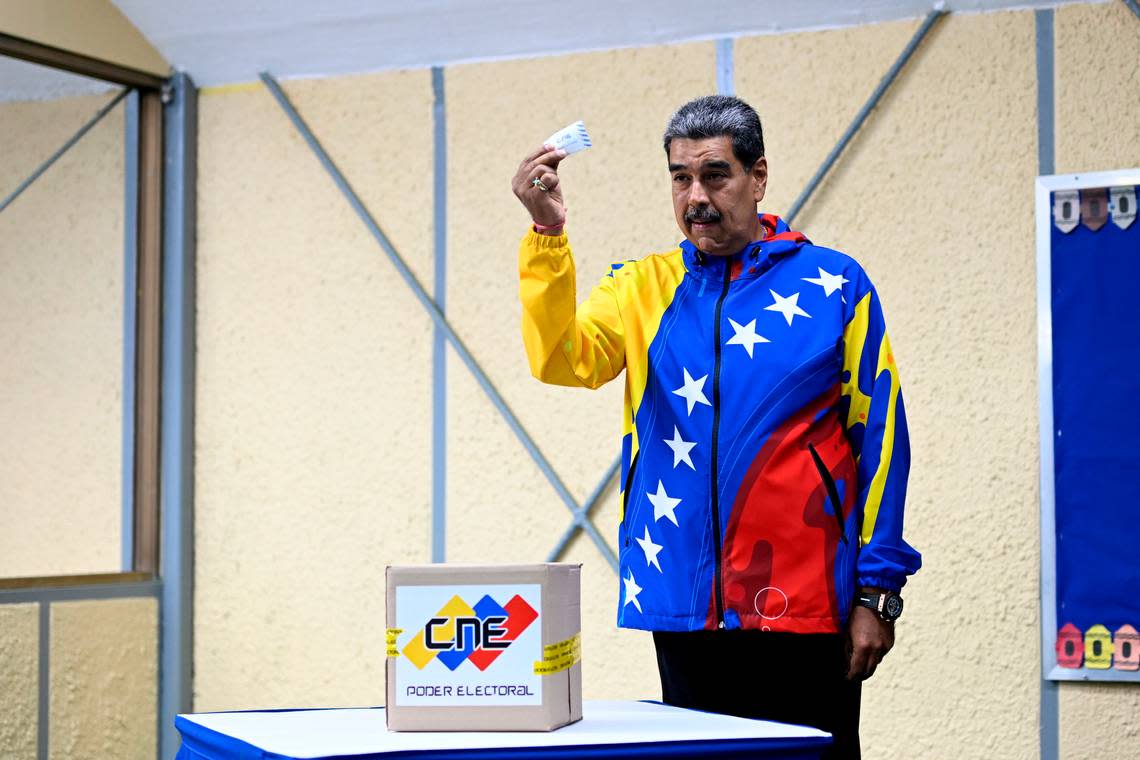Maduro’s election fraud: the biggest scandal in Latin America’s recent memory | Opinion

- Oops!Something went wrong.Please try again later.
- Oops!Something went wrong.Please try again later.
In my four decades of covering Latin America, I have seen many electoral frauds. But what happened July 28 in Venezuela certainly looks like the mother of all stolen elections.
In most rigged elections in the region, authoritarian rulers typically manipulate the vote count to give themselves an extra one or two percent of the vote. But in Venezuela’s case, strongman Nicolás Maduro went overboard: He fabricated as much as 40% of his votes, according to opposition counts and exit polls.
Venezuela’s government-controlled National Electoral Council stunned observers with the announcement in the early hours of Monday that Maduro had won the elections with 51.2% of the vote, against united opposition candidate Edmundo Gonzalez Urrutia’s 44.2%.
Opposition leader Maria Corina Machado, who backed Gonzalez Urrutia after she was banned from running by the Maduro regime, said she can prove with copies of voting tallies that Gonzalez Urrutia won 70% of the vote, while Maduro was way behind with 30%. It was “the biggest margin of difference” in Venezuelan history, Machado said.
You could say that it’s one party’s word against the other, but there are several reasons to believe that Maduro’s official results are fraudulent.
First, all credible pre-election polls showed opposition candidate Gonzalez Urrutia leading Maduro by more than 25 percentage points, a massive advantage by any standard. One poll by the ORC consulting firm gave Gonzalez Urrutia 60% of the vote, while Maduro had only 14.6%.
Second, an exit poll on election day by Edison Research, the respected polling firm that does exit polls for major TV networks in U.S. and other countries’ elections, concluded that Gonzalez Urrutia got 64% of the vote, while Maduro got only 31%. Edison’s exit poll interviewed 6,846 voters in 100 polling centers across Venezuela.
The Venezuelan government’s election results “run completely contrary to what our survey showed,” Edison’s Executive Vice President Rob Farbman told Colombia’s FM radio station Monday. The exit poll showed it “was basically a landslide for Gonzalez (Urrutia) and the opposition,” he added.
Third, on election night, the Maduro regime delayed the release of voting results for six hours, and prohibited opposition leaders from getting access to the vote tallies at the National Electoral Council. At the time of this writing, Maduro’s electoral authorities have not yet released detailed election results at the polling station level, as required by Venezuelan law.
Long before election day, Maduro had also denied the right to vote to an estimated 4.5 million Venezuelans living abroad, who are mostly government opponents and represent more than 20% of the country’s total voters. In addition, he had banned Machado, the country’s most popular opposition leader, and several other top opposition figures from running, arrested opposition activists and censored the media.
“This was the biggest election steal in Latin America’s modern history,” former Bolivian President Jorge Tuto Quiroga, who was invited to observe the election by the opposition but was denied entry into the country by Maduro, told me.
Still, Maduro’s election steal may not leave him in firm control of the country. History is full of examples of authoritarian rulers who rigged elections, only to later face violent backlashes.
Bolivia’s former authoritarian populist leader Evo Morales rigged the 2019 elections, and was soon forced to step down by a combination of mass protests and international pressures. Ukraine’s fraudulent 2004 presidential elections led to mass protests known as the Velvet Revolution, which moved the country’s supreme court to order a new election that was won by the opposition.
Doubts about Maduro’s election results will only keep growing, because he refuses to publish the voting machine tallies. If Maduro had won the elections, it would be in his best interest to show his people — and the world — the detailed polling data. But he’s not releasing them, which is additional evidence of his monumental fraud.
Don’t miss the “Oppenheimer Presenta” TV show on Sundays at 9 pm E.T. on CNN en Español. Blog: andresoppenheimer.com

